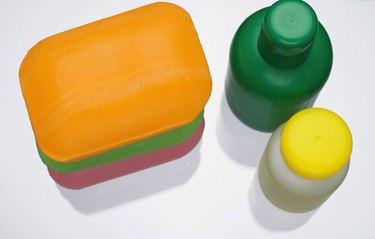
Although people often think of soap and detergents as interchangeable, they are two different products employed for the same purpose. Both boost the cleansing action of water and remove dirt. Soap and detergents remove soil from clothing, dishes and household items. We also bathe with either soap or detergents. Soaps and detergents come in bars, powders, liquids and gels.
History
Video of the Day
Soap carries a longer history than detergents. Archaeologists have found evidence of soap production dating back to 2800 B.C. Italy, Spain and France produced soap earlier than other Europeans. England began soap manufacturing in the 12th century. Demand for soap in Europe and the American colonies rose sharply during the 1600s. Detergents are a relatively recent creation. German scientists developed detergents in 1916 as a result of fat shortages during World War I. Since 1953, consumers have purchased more detergents than soap.
Video of the Day
Function
Soap and detergents dissipate the oil that holds dirt using emulsifiers. Emulsifiers disperse the oil into small particles, and act as a means of wetting more thoroughly. Emulsifiers suspend the dirt particles in the water. The dirt then rinses easily away. Soap and detergents are also surfactants. Surfactants contain molecules with a head and tail. The tail grabs the grease or oil, as the head of the molecule dissolves in the water, washing away the dirt.
Types
Soaps contain natural sodium or potassium salts of fatty acids. It is manufactured using oils or fats, water and lye. A detergent is synthetic. Detergents consist of petroleum products combined with surfactants, foaming agents and alcohol. Manufacturers add scents to disguise the odor of these ingredients. Whiteners, enzymes and suds control agents are other possible detergent additives. Laundry detergent manufacturers may add ingredients called builders to detergents. Builders enhance cleaning, but contain phosphates. Many states ban phosphates due to their adverse effect on waterways.
Considerations
Soap creates scum in hard water. Minerals such as calcium, iron, magnesium or manganese form a substance that does not break down in hard water. The soap molecules become insoluble and will not wash away as easily. Soap residue turns laundry gray. Even in soft water, soap will eventually cause a buildup of calcium and manganese on clothing, tubs and shower stalls. The minerals in hard water do not affect detergents in this way.
Warning
Inexpensive soaps may contain beef tallow (fat). Beef tallow can cause skin breakouts. Better-quality soaps feature palm oil, olive oil or coconut oil instead of beef fat.